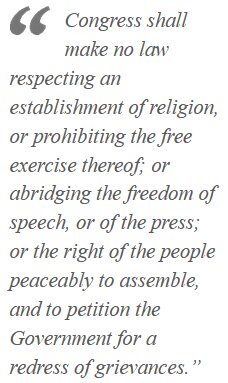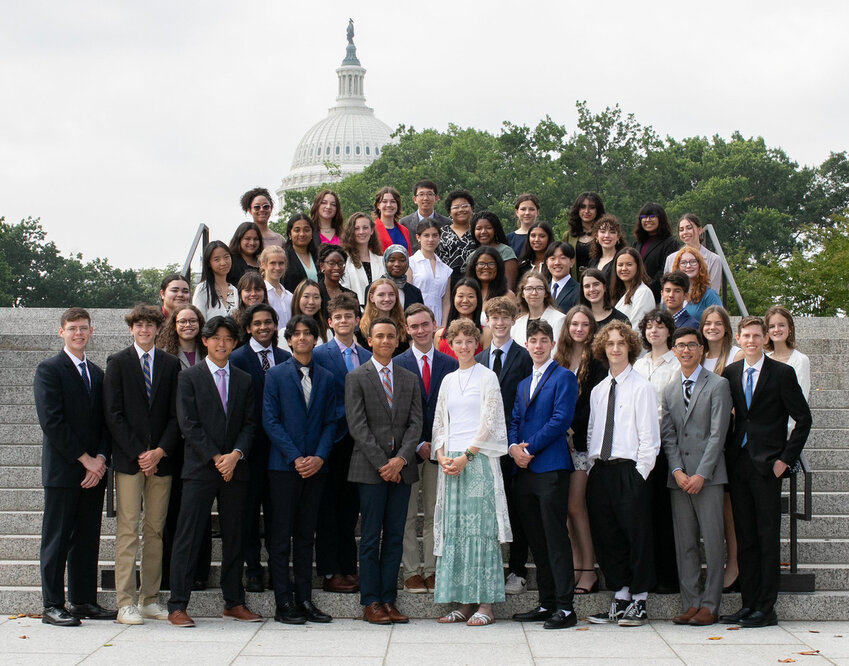
The First Amendment of the U.S. Constitution is being pressured in new ways. The pandemic pitted the government's public safety concerns against at least three of the First Amendment's five pillars: religion, assembly and the right to petition the government.
In recent weeks, politicians have called for the defunding of colleges and universities that allow anti-Israel protests on their campuses and for revoking student visas for protesting in ways politicians call “unAmerican.”
Government leaders have leaned into authoritarian impulses, proclaiming the press as the enemy of the people and threatening to strip TV networks of their FCC licenses. Then there’s the muddy clash over the government's role in fighting misinformation or disinformation on social media by pressuring or regulating social media companies.

The Freedom Forum is a nonpartisan nonprofit organization tracking these issues, defending the First Amendment and keeping protections in the public spotlight. The Freedom Forum was established on Independence Day in 1991.
Its services include training and programs for journalists to understand First Amendment issues better. The organization can help news institutions assert their freedom relating to press rights and help journalists stay mindful of First Amendment threats on their beats.
There are three ways the Freedom Foundation helps publishers:


State of the First Amendment
Many believe journalism should play a role in highlighting threats to all of the First Amendment's tenets. Freedom Forum studies this topic by polling attitudes toward First Amendment freedoms, including the press's role in protecting them.
A survey of 800 respondents ages 16 and older conducted in March by Freedom Forum showed that four in 10 Americans couldn’t identify the press as a First Amendment freedom. Just 36% of respondents said they believed today's media is a protector of liberty, compared to 21% who viewed media as a threat.
“Over time, the First Amendment has always ebbed and flowed,” said Freedom Forum's First Amendment specialist Kevin Goldberg. Goldberg is an attorney who has been involved in representing news industry interests. He served as vice president of legal for the Digital Media Association, and his former clients include the News Leaders Association (formerly the American Society of News Editors) and others.

Goldberg said the First Amendment saw several challenges through the Civil Rights era of the 1960s and into the 1970s with monumental clashes such as the Pentagon Papers case. He said another era of First Amendment challenges was ushered in following the 9/11 attacks.
“And then Covid happened, and then, frankly, Donald Trump happened, and there were waves of legislation at the state level,” Goldberg said. “All of which results in what I think are pretty significant threats in different ways to the First Amendment, magnified by a rise in social media activity that makes it easier for information that may or may not always be accurate to be shared online. So yes, I think we're back into an ebb of First Amendment fights at the moment, and the challenge of balancing again from people really stepping up and fighting the good fight.”
Goldberg and Freedom Forum spokesman Jonathan Thompson both emphasized that the nonprofit organization is nonpartisan.
Threats to press freedom

Goldberg has followed the evaporating revenue streams going toward newspapers, which have been a pillar of public accountability for many generations. He sees the economics of the business as an ongoing threat not just to cover government bodies and officials, but also to fight legal battles that endanger press freedoms.
“I think a couple of big areas (publishers) should be worried about are this latent ongoing attack on New York Times v. Sullivan, the one that created the actual malice standard," Goldberg said. "It offers a lot of protection for reporters aggressively pursuing stories and publishing stories about public officials and figures. I personally do not think that the Supreme Court will overturn New York Times v. Sullivan, but I've been wrong before. If I am wrong here, it would be a massive blow. The fact that it is still in the conversation is concerning because that is such a huge protection as it allows (a reporter) to go after a story criticizing someone in the public eye and get it wrong as long as you're working hard to do your best. I think we all agree that reporters do work hard to do their best.
“And this narrative around New York Times v. Sullivan has gained enough traction in certain circles to make this a continuing problem.”
Goldberg also has concerns about so-called SLAPP lawsuits. These are lawsuits that concern defamation or any case that is filed simply to silence a defendant who is writing something critical about the plaintiff. SLAPP is an acronym for Strategic Lawsuit Against Public Participation. Thirty states have anti-SLAPP statutes that make it easier for defendants to get cases dismissed through expedited court processes.
Goldberg is an expert source for government, political or legal reporters to contact on First Amendment matters.
“Our mission is to foster First Amendment freedoms,” he said. “My job is to talk to reporters about these things and do so in a way that not only helps reporters do their job but hopefully helps the public best understand what’s at stake. Our goal is to ensure an America where everyone knows these values and defends the First Amendment. So much of America doesn’t really understand enough about the First Amendment, and reporters are the ones that help make that connection.”
 Bob Miller has spent more than 25 years in local newsrooms, including 12 years as an executive editor with Rust Communications. He also produces an independent true crime investigative podcast called "The Lawless Files."
Bob Miller has spent more than 25 years in local newsrooms, including 12 years as an executive editor with Rust Communications. He also produces an independent true crime investigative podcast called "The Lawless Files."
Comments
No comments on this item Please log in to comment by clicking here